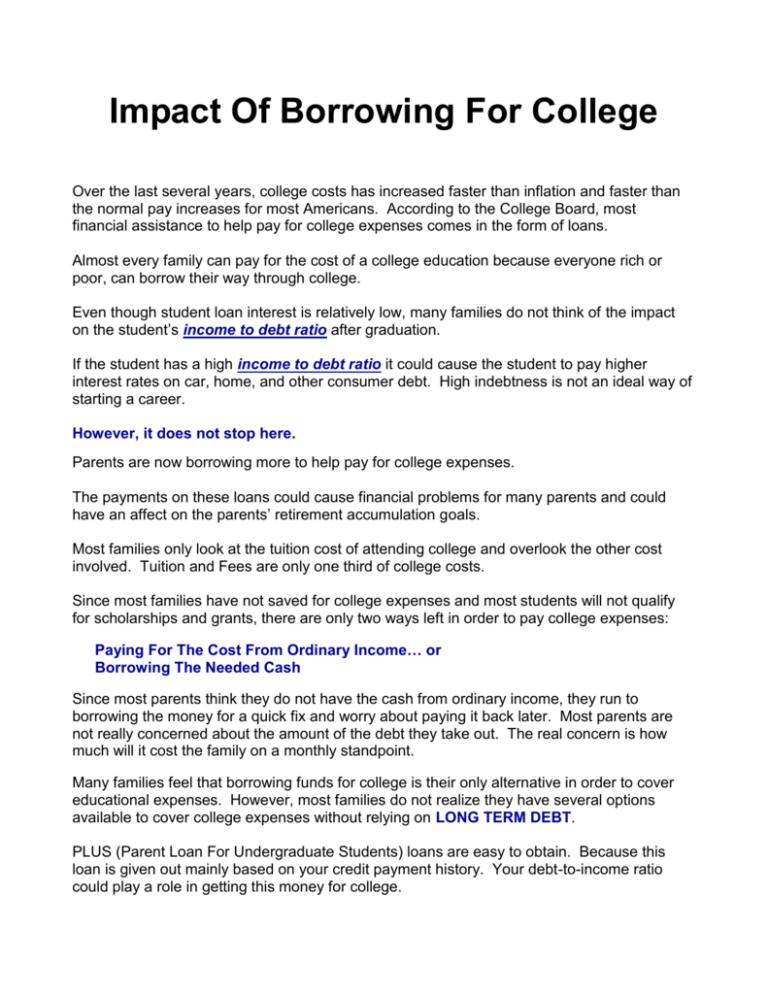Impact Of Borrowing For College
advertisement

Impact Of Borrowing For College Over the last several years, college costs has increased faster than inflation and faster than the normal pay increases for most Americans. According to the College Board, most financial assistance to help pay for college expenses comes in the form of loans. Almost every family can pay for the cost of a college education because everyone rich or poor, can borrow their way through college. Even though student loan interest is relatively low, many families do not think of the impact on the student’s income to debt ratio after graduation. If the student has a high income to debt ratio it could cause the student to pay higher interest rates on car, home, and other consumer debt. High indebtness is not an ideal way of starting a career. However, it does not stop here. Parents are now borrowing more to help pay for college expenses. The payments on these loans could cause financial problems for many parents and could have an affect on the parents’ retirement accumulation goals. Most families only look at the tuition cost of attending college and overlook the other cost involved. Tuition and Fees are only one third of college costs. Since most families have not saved for college expenses and most students will not qualify for scholarships and grants, there are only two ways left in order to pay college expenses: Paying For The Cost From Ordinary Income… or Borrowing The Needed Cash Since most parents think they do not have the cash from ordinary income, they run to borrowing the money for a quick fix and worry about paying it back later. Most parents are not really concerned about the amount of the debt they take out. The real concern is how much will it cost the family on a monthly standpoint. Many families feel that borrowing funds for college is their only alternative in order to cover educational expenses. However, most families do not realize they have several options available to cover college expenses without relying on LONG TERM DEBT. PLUS (Parent Loan For Undergraduate Students) loans are easy to obtain. Because this loan is given out mainly based on your credit payment history. Your debt-to-income ratio could play a role in getting this money for college. This could be very dangerous for the financial wellbeing of the parents. Borrowing too much money in the parents’ name could have a drastic affect on future borrowing needs, not to mention taking money away that should be placed aside for retirement. IMPACT ON STUDENT Borrowing too much money in the student’s name could also have a negative affect on the future debt-to-income ratio of the student once the student receives a degree and enters the job market. If a student (after graduation) can keep their debt-to-income ratio of 10 percent or less, it is considered very good, (excluding holding a mortgage). A debt-to-income ratio of 20 to 28 percent is acceptable after graduation as long as the student’s income is enough to manage the debt, (excluding holding a mortgage). If a student has a debt-to-income ratio of 40 to 50 percent they are in the danger of not getting needed credit and could cause the student to pay high interest rates on consumer debt. If you have to borrow for college, make sure it does not have a negative consequence on other future borrowing needs as well as the impact on your retirement. Let’s take a look at the impact of borrowing for college. Below we will outline the cost of borrowing in relationship to the parents’ Debt-To-Income Ratio and how it will affect the parent’s retirement goals. Example: Family makes $93,000 a year and has the following debt: Home Mortgage - $168,000 with a monthly payment of $1,980 Car Payment - $18,000 with a monthly payment of $365 Credit Card Payments - $10,000 with a monthly payment of $148 The Debt-To-Income Ratio of this family is 32% which is in the fair/good category. Let’s assume a parent borrowed $40,000 in Direct PLUS loans over a 5 year period to help cover the cost of a $17,000 ($85,000 over 5 years) public university. As you will recall the interest at the present time for PLUS loan borrowers is 7.9% and normally repaid over a 10 year period. PLUS Loan Payment - $40,000 with a monthly payment of $496 Interest Paid Over 10 years - $19,513 Total Money Paid Back Over 10 Years - $59,513 The Debt-To-Income Ratio is now 39%, which is getting near the DANGER ZONE of 40% 50%. If the parents had to borrow additional money, they could find they could pay higher interest rates and possibly have trouble securing additional debt. Now let’s look at what affect the PLUS Loan has on their retirement. Let’s assume the parent that took out the PLUS Loans was age 50 and had 15 years from retirement. If he had invested the $496 a month into a tax deferred investment over a 10 year period, made no more deposits after the 10 years and received a 7% return on his investment, his total accumulation at age 65 would be approximately $123,412. Let’s look at what the true cost of the student’s college education was for the parent. Interest paid on the PLUS Loan - $ 19,513 Plus - $123,412 in potential retirement accumulation Total $142,925 Many families feel it only cost $40,000 for the education, but based on this example, it cost the family $142,925. This is a difference of $102,925 ($142,925 - $40,000). Of course this does not take into consideration the potential tax deduction the parent could received (Maximum of $2,500 interest deduction a year). However, if we did take this into consideration the approximate tax savings over the 10 year period (based on a 25% tax bracket) could be less than $4,100. Now let’s look at the cost to the student that borrows $23,000 over a 5 year period (this is the average debt according to the College Board). Example: Student starting income after graduation is $38,000 and has the following debt: Student Loans - $23,000 with a monthly payment of $261 Car Payment - $8,000 with a monthly payment of $155 Credit Card Payments - $3,000 with a monthly payment of $60 Rent - $800 a month The Debt-To-Income Ratio of the student is 40% which is in the DANGER ZONE. If the student had to borrow additional money, they could find they could pay higher interest rates and possibly have trouble securing additional debt. FINIAL NOTES ON BORROWING FOR COLLEGE A college education is a ticket to a better quality of life for most college graduates. Unfortunately, some students and parents do not think clearly about select the right college that is affordable and can give the student the education that they are wanting to pursue. Many student will pursue the most elite colleges without thinking about the potential debt that this decision could cause. Regardless whether the student attends a high cost private college or an in-state university, not taking the cost of borrowing into consideration when selecting a college could destroy their chances for a brighter future. Robert Shireman, executive director for the nonprofit Project on Student Debt said, "Excessive student debt, often made without an explicit decision on its impact on future life choices, not only restricts traditional career choices but the basic ability of young people to take risks – requiring them to defer their dreams." According to the National Association of Colleges and Employers, students graduating from college in 2008 will earn an average salary of $36,400 a year. This seems like an adequate income for a young individual. However, if you look at the income on an after tax standpoint the student will only clear approximately $27,500 or $2,300 a month after taxes. According to federal tables, 2008 graduates will spend on the average $1,800 to $2,000 a month for rent, utilities, out-of-pocket healthcare, car payments, gasoline, insurance and, entertainment. However, these figures do not take into consideration of social debt or debt pertaining to credit cards, personal loans, and money set aside for emergencies or retirement. Therefore, before selecting a college, the student and parents should think about how much the education will cost and the potential income that their degree will produce before borrowing any money to pay for the education.



